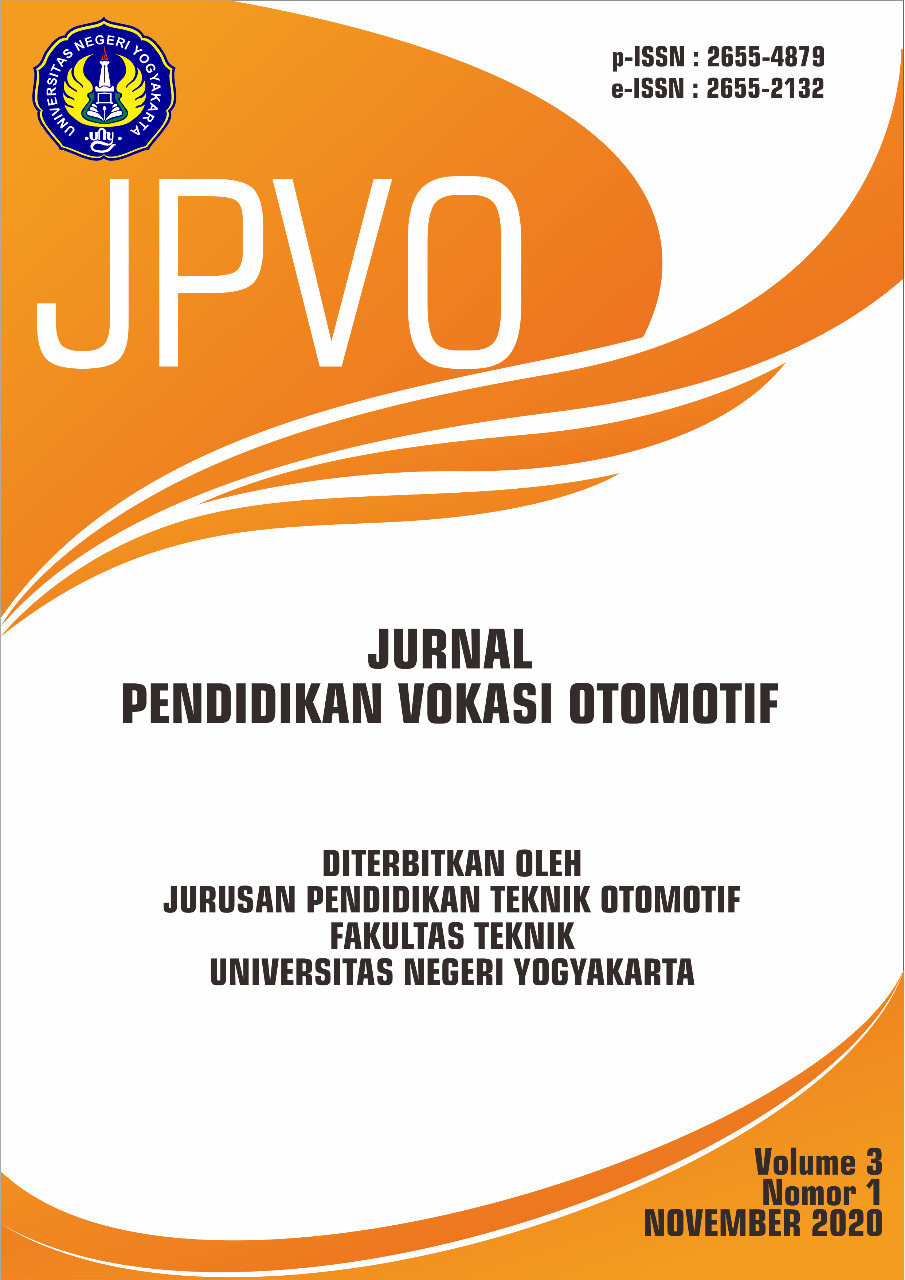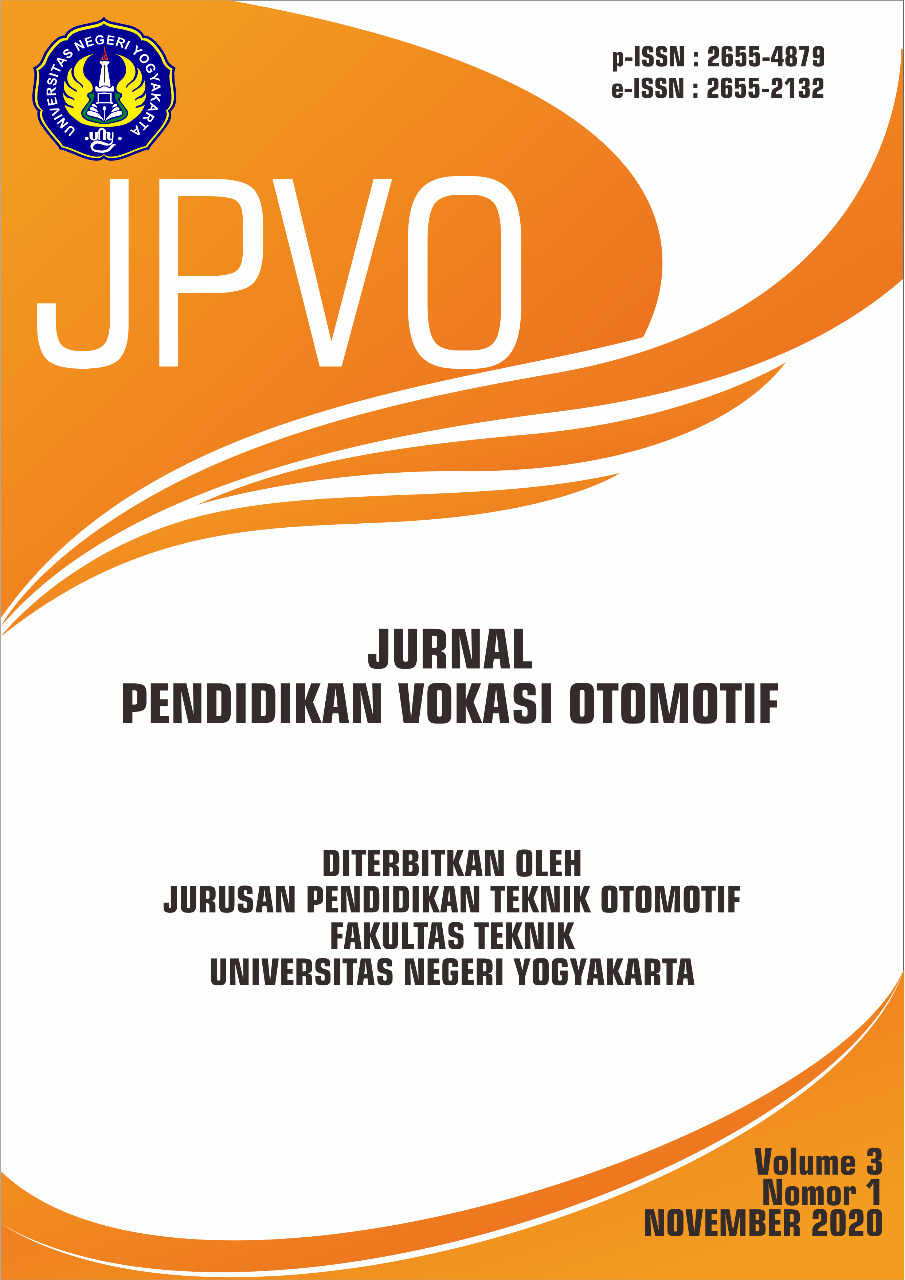PENGEMBANGAN MODUL AJAR SEPEDA MOTOR LISTRIK DI SMK MUHAMMADIYAH PRAMBANAN
Pengembangan Modul Ajar Sepeda Motor Listrik
DOI:
https://doi.org/10.21831/jpvo.v8i1.88672Abstract
Penelitian ini bertujuan mengembangkan modul ajar Sepeda Motor Listrik yang layak digunakan untuk mata pelajaran Ototronik kelas XI TBSM di SMK Muhammadiyah Prambanan. Penelitian ini menggunakan metode Four-D dari Tiagarajan dan Sammel, data dikumpulkan melalui wawancara, observasi, dan angket. Tahapan yang digunakan dalam pengembangan modul ajar meliputi define, design, development dan disseminate. Hasil penelitian menunjukkan validasi oleh ahli materi (90%), ahli media (88,75%), respon kelayakan dari guru (89,16%) dan respon kelayakan peserta didik (83,57%), secara keseluruhan modul ajar sepeda motor listrik dikategorikan “sangat layak” dan modul siap menjadi pedoman pembelajaran. Sebagai rekomendasi, modul ini perlu diimplementasikan secara menyeluruh di SMK tersebut. Penelitian lanjutan disarankan untuk mengevaluasi efektivitas terhadap hasil belajar dan keterampilan siswa setelah menggunakan modul ajar dan bila perlu memperbarui modul dengan informasi terbaru, serta memperluas penyebarannya ke SMK lain yang memiliki jurusan serupa.
References
DAFTAR PUSTAKA
Basirun, B., Sofyan, H., Arifin, Z., Mutohhari, F., & Rabiman, R. (2023). Hybrid electric vehicles: A review of performance in various temperature conditions. AIP Conference Proceedings, 2671, 1–10. https://doi.org/10.1063/5.0114632
Bathla, G., Bhadane, K., Singh, R. K., Kumar, R., Aluvalu, R., Krishnamurthi, R., Kumar, A., Thakur, R. N., & Basheer, S. (2022). Autonomous vehicles and intelligent automation: applications, challenges, and opportunities. In Mobile Information Systems (Vol. 2022, pp. 1–15). https://doi.org/10.1155/2022/7632892
Benajes, J., García, A., Monsalve-Serrano, J., & Martínez-Boggio, S. (2020). Emissions reduction from passenger cars with RCCI plug-in hybrid electric vehicle technology. Applied Thermal Engineering, 164(18), 1–12. https://doi.org/10.1016/j.applthermaleng.2019.114430
Billett, S. (2011). Vocational Education: Purposes, Traditions and Prospects. Springer. https://doi.org/10.1007/978-94-007-1954-5
Cao, J., Chen, X., Qiu, R., & Hou, S. (2021). Electric vehicle industry sustainable development with a stakeholder engagement system. Technology in Society, 67(1), 1–15. https://doi.org/10.1016/j.techsoc.2021.101771
Chen, T., Zhang, X. P., Wang, J., Li, J., Wu, C., Hu, M., & Bian, H. (2020). A Review on electric vehicle charging infrastructure development in the UK. In Journal of Modern Power Systems and Clean Energy (Vol. 8, Issue 2, pp. 1–14). https://doi.org/10.35833/MPCE.2018.000374
Clark, L., & Winch, C. (2007). Vocational Education : International Approaches, Developments and Systems. Routledge.
Edelenbosch, O. Y., McCollum, D. L., Pettifor, H., Wilson, C., & Van Vuuren, D. P. (2018). Interactions between social learning and technological learning in electric vehicle futures. Environmental Research Letters, 13(12), 1–15. https://doi.org/10.1088/1748-9326/aae948
Higueras-Castillo, E., Singh, V., Singh, V., & Liébana-Cabanillas, F. (2024). Factors affecting adoption intention of electric vehicle: a cross-cultural study. Environment, Development and Sustainability, 26(11), 29293–29329. https://doi.org/10.1007/s10668-023-03865-y
Kumar, A., & Thakura, P. R. (2019). Performance evaluation of hybrid electric vehicles for sustainable transport system. International Journal of Innovative Technology and Exploring Engineering, 8(11), 1–16. https://doi.org/10.35940/ijitee.K1280.0981119
Kurniawan, R., Jaedun, A., Mutohhari, F., & Kusuma, W. M. (2021). The absorption of vocational education graduates in the automotive sector in the industrial world. Journal of Education Technology, 5(3), 482–490. https://doi.org/10.23887/jet.v5i3.35365
Macharia, V. M., Garg, V. K., & Kumar, D. (2023). A review of electric vehicle technology: Architectures, battery technology and its management system, relevant standards, application of artificial intelligence, cyber security, and interoperability challenges. In IET Electrical Systems in Transportation (Vol. 13, Issue 2, pp. 1–14). https://doi.org/10.1049/els2.12083
Meszaros, F., Shatanawi, M., & Ogunkunbi, G. A. (2020). Challenges of the electric vehicle markets in emerging economies. Periodica Polytechnica Transportation Engineering, 49(1), 93–101. https://doi.org/10.3311/PPTR.14037
Mutohhari, F., Sutiman, S., Nurtanto, M., Kholifah, N., & Samsudin, A. (2021). Difficulties in implementing 21st century skills competence in vocational education learning. International Journal of Evaluation and Research in Education, 10(4), 1229–1236. https://doi.org/10.11591/ijere.v10i4.22028
Onyilo, I. R., Arsat, M., Latif, A. A., & Akor, T. S. (2020). Green automobile technology competencies in Nigeria and the fourth industrial revolution. Journal of Critical Reviews, 7(7), 865–869. https://doi.org/10.31838/jcr.07.07.157
Pukalo, M., & Prokhorovskyi, Y. (2019). Training professionals in repairing and maintaining electric vehicles in Ukraine. Scientific Bulletin of South Ukrainian National Pedagogical University Named after K D Ushynsky, 2019(2), 7–13. https://doi.org/10.24195/2617-6688-2019-2-1
Putri, G. E., Sudira, P., Sofyan, H., Mutohhari, F., Saputro, I. N., & Ramadhan, M. A. (2025). Determining green technology usage behaviour in vocational education and learning. Multidisciplinary Science Journal, 7(9), 1–11. https://doi.org/10.31893/multiscience.2025347
Rabiman, R., Sudira, P., Sofyan, H., & Nurtanto, M. (2021). Practical learning media in subject maintenance of chassis and power (MCP) based online: Simple learning using videos on YouTube. International Journal of Interactive Mobile Technologies, 15(1), 130–145. https://doi.org/https://doi.org/10.3991/ijim.v15i03.14943
Ruoso, A. C., & Ribeiro, J. L. D. (2022). The influence of countries’ socioeconomic characteristics on the adoption of electric vehicle. Energy for Sustainable Development, 71(1), 251–262. https://doi.org/10.1016/j.esd.2022.10.003
Saleet, H., Aldamsah, A., Banikhaled, M., Abu-Baker, A., Damseh, R. A., Al-Smadi, M., Mostafa, A., Adaileh, W., Alahmer, A., Al-Salaymeh, A., Al Twassi, S., AlBeek, R., & Hassouneh, K. (2023). Importance and barriers of establishing educational/training programs in electric vehicles/hybrid-electric vehicles in jordan. World Electric Vehicle Journal, 14(9), 1–14. https://doi.org/10.3390/wevj14090232
Sudarsono, B., Arief Ghozali, F., Tentama, F., Asti Mulasari, S., Wahyuni Sukesi, T., Sulistyawati, S., Yuliansyah, H., Nafiati, L., Listyaningrum, P., Pratama, W., R. Hafid Hardyanto, S., & Rahmawati, R. (2024). Development of an integrated electric vehicle learning simulator (EVLIS) with industry-based learning to accelerate work readiness of vocational school students. Bulletin of Pedagogical Research, 4(1), 1–15. https://doi.org/10.51278/bpr.v4i1.1029
Downloads
Published
How to Cite
Issue
Section
Citation Check
License

This work is licensed under a Creative Commons Attribution-ShareAlike 4.0 International License.
Jurnal Pendidikan Vokasi Otomotif allows readers to read, download, copy, distribute, print, search, or link to the full texts of its articles and allow readers to use them for any other lawful purpose. The journal allows the author(s) to hold the copyright without restrictions. Finally, the journal allows the author(s) to retain publishing rights without restrictions

Jurnal Pendidikan Vokasi Otomotif is licensed under a Creative Commons Attribution-ShareAlike 4.0 International License.
Based on a work at https://journal.uny.ac.id/index.php/jpvo.









